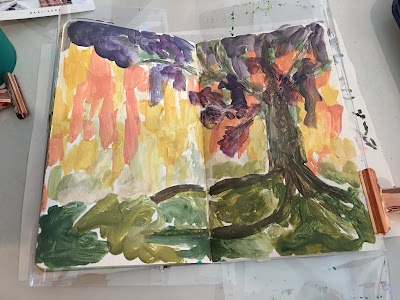I'm usually a serial monogamist as a reader, but I do often make an exception for nonfiction, taking slower read of a nonfiction tome, coming to it intermittently between novels. My nonfiction this month has been Trickster Makes This World by Lewis Hyde (and, in fact, I thought I'd have gotten further with it before now because the Trickster subject matter really appeals to me; I think I've just had some especially quick/binge-worthy fiction reads lately keeping me away).In Trickster, Hyde takes an approach that draws from anthropology, literary and art criticism, biology, psychoanalysis, and more. He discusses the archetype of the trickster, the trickster role in myth, and modern and contemporary artists who have tapped into some of the trickster energy. There's a focus on Hermes, but Coyote and Raven from Native American traditions and Eshu and Legba from West African traditions also get ample discussion. Monkey from Journey to the West gets some mention as do Loki and Krishna. Hyde is a compelling writer, erudite in associations yet employing a conversational, often humorous vernacular.
In the first section of the book, Hyde discusses the Trickster as a figure tied to appetite (yet one who can, in many cases, delay gratification in order to better fulfill more spiritual appetites and desires). Next, he delves into the chaotic aspects of Trickster and the role of chance/accident (and, indeed, change) in maintaining a meaningful existence. This includes discussion of John Cage's aleatoric composition and Yoruba divination practices. Hyde goes on to discuss Trickster in terms of shame, shamelessness, and obscenity, tying him to Jung's shadow. The discussion of shame culture and its disruption includes a focus on the writings of Maxine Hong Kingston, Richard Rodriguez, and Allen Ginsburg. I'm just starting the fourth section on Trickster and the trap of culture, but I'm looking forward to seeing where it goes.
(I'm also looking forward to the appendices, which include Hyde's own translation of a Homeric hymn and a discussion of trickster and gender. I don't know that I'll fully agree with the latter analysis, but I appreciate that it's there. I'm also intrigued by Hyde's earlier book, The Gift; while Trickster, Hyde discusses the windfall of gift of Hermes/fortune that can disrupt fate and social order (and how art can play this role), he includes a note that The Gift discusses how a gift economy (and the imaginative work of artists) can create a social order. It makes me think of the gift/favour economy described in All Our Kin, a work of anthropology that had a real impact on my thinking. Trickster Makes This World took several years to write and was first published in 1998, so it's dated in some ways while eerily relevant in a few others--just this year, for instance, I've seen it referenced by Tressie McMillan Cottom.)
Trickster Makes This World was a Literati Joseph Campbell book club selection. I've been quite pleased with the book club picks. Although it's not cheap, at $20 a month it's not that much more than buying a full-price book (which is, frankly, not something I do all that often anymore). Some highlights have been the first pick, The Wayfinders, essays by anthropologist Wade Davis; Circe, a novel I'd heard good things about but just hadn't quite picked up until it landed on my doorstep; and The One Hundred Nights of Hero by Isabel Greenberg, a graphic novel that explores storytelling, feminism, and Scheherazade.
And Literati offers me the opportunity to do an unboxing blog post! Here's May's book, which arrived in the mail this week, The Spell of the Sensuous by David Abraham, a nonfiction selection that looks to focus on perception. Although I have to admit, I'm ready for some more fiction, this does look interesting; the chapter titles (such as "Animism and the Alphabet") also intrigue. A quibble, though: there are almost three pages of blurbs in the front of the book, many of them interesting, and 13 of the 16 are from men, only 2 from women. This probably reflects publishing norms in general and not just the author/publishers/readership of this particular book, but it definitely suggests a blind spot.








































